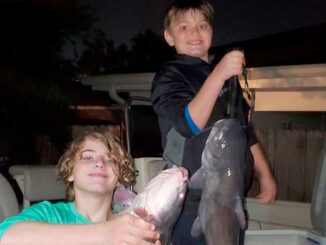
Jindal administration wants to pull $2 million from LDWF’s Conservation Fund to help balance budget.
Among the contingencies propping up Gov. Bobby Jindal’s budget proposal is a unique and possibly unprecedented land deal involving the state selling properties at a significant markup to, well, itself. That’s the latest twist in the winding debate over Jindal’s proposed $24.7 billion budget, which is short on revenues by about $1.3 billion.To fill that revenue hole, the administration is grabbing money from various dedicated funds (including the Artificial Reef Fund) and betting on contingencies that include privatization contracts, 11 land deals and other mechanisms that conservative lawmakers say are fiscally uncertain — despite recent assurances from Commissioner of Administration Kristy Nichols that they’re safe bets.
One of the proposals would transfer 29 lots of property totaling slightly more than 3,080 acres from the Office of State Lands to the Department of Wildlife and Fisheries, which would pay $2 million from the agency’s Conservation Fund in return.
Intended to be used with wildlife refuges and management areas, the lands are located in Ascension, Bienville, Bossier, Franklin, Grant, Pointe Coupee, Rapides, St. Charles, St. Tammany, Tangipahoa and West Feliciana parishes.
The state acquired the parcels at little or no cost.
“But they still have a cumulative value of $2 million,” said Michael DiResto, the division’s assistant commissioner of policy and communications.
That the state is selling land to itself for use as wildlife management areas and refuges is unprecedented in recent memory, LDWF attorney Cole Garrett said.
“It hasn’t happened in the three years I’ve been here,” he says, adding that “no one else I’ve spoken with can recall it happening before.”
When asked to identify similar land deals dating back farther, the Division of Administration was unable to provide any information.
The state routinely transfers property to governmental entities at no cost. In the current legislative session, four bills would transfer land from the state to the cities of Pineville and Ruston, as well as Lafourche, Orleans and St. Martin parishes. In Lafourche, the land would be used for a public boat launch.
DiResto said the administration is “simply using diligence in managing state resources, using vacant land parcels owned by the Office of State Lands that are adjacent to wildlife management areas or refuges and incorporating them into Wildlife and Fisheries’ management areas to provide recreational opportunities.”
How much anglers and others would actually use those lands is another matter. According to information and documents released by the Division of Administration for this story, the properties include former lakes that are now dry beds, lands that reverted from federal to state ownership and one tract that is a batture or elevated riverbed.
LDWF Secretary Robert Barham said his team is always looking for add-ons, and that various terrains are needed to accommodate everyone from campers and hikers to bird watchers and nature photographers.
“To that end, we have been working with State Lands to identify properties that could be incorporated as WMA properties, and will continue to do so,” Barham said.
Taking $2 million from the Conservation Fund to help Jindal balance his proposed budget is also problematic. The fund is already under attack on another front.
The administration wants to pull $20.6 million out of the Artificial Reef Development Fund — to which the oil and gas industry contributes — that helps create underwater habitats using decommissioned drilling rigs.
Jindal already has taken $45 million from the reef fund since the 2009-10 fiscal year.
Members of the Louisiana Wildlife and Fisheries Commission, all appointed by the governor, are close to filing a lawsuit over the matter. They argue the money should be used as intended, not how the governor sees fit.
“The (rigs-to-reefs) donations are made to the Conservation Fund, which is constitutionally protected,” Louisiana Wildlife Federation Executive Director Rebecca Triche said.
